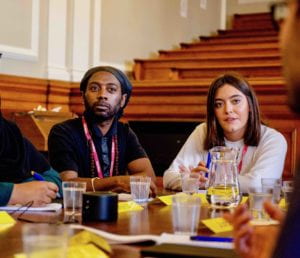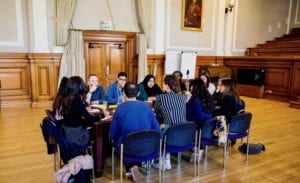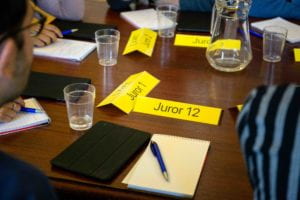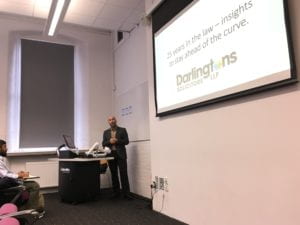
We are thrilled to announce a number of outstanding opportunities for our LLB Law students to go on commercial awareness visits, including to a premier global law firm, Magic Circle firms, Facebook and the American boutique law firm famous for its involvement in high-profile cases such as United States v Microsoft, Perry v Brown and Bush v Gore.
These exciting activities are delivered in the context of the Year 1 ‘Contract Law’ module, led by Dr Dagmar Myslinska, and mirror our innovative teaching approach that embeds experiential learning and career development activities into contact time in all our modules.
29 November – guest lecture by Dr Simon Witney from Debevoise & Plimpton LLP. Dr Witney is a Solicitor and a Special Counsel in the Private Equity, Funds/Investment Management and Business Integrity Groups at Debevoise & Plimpton LLP. A prominent member of the UK and European private equity communities, he is a regular speaker and commentator on company law, corporate governance and regulatory matters. He has advised private equity clients as well as the UK Government on a wide range of fund and transactional matters, is a member of the British Private Equity and Venture Capital Association, and a past Chair of Invest Europe’s Tax, Legal and Regulatory Committee. Dr Witney is also a Visiting Professor in Practice in the Law Department at the LSE.
Debevoise & Plimpton LLP is a premier global law firm, with approximately 700 lawyers working in nine offices across three continents, including more than 120 in London. It is best known for private equity, mergers and acquisitions, financial services-related matters, white collar and regulatory defence, and top-level litigation matters (the former UK attorney general, Lord Peter Goldsmith QC, works in the London office). The firm’s core clients tend to come from banking, health care, insurance, private equity and technology, and media and telecommunications industries.
7 February – study trip for a guest lecture by Jantira Raftery at Facebook’s London office in Fitzrovia.
Ms Raftery is Competition Counsel on the in-house legal team at Facebook, covering competition and antitrust matters across Europe.
Prior to joining Facebook, Ms Raftery was a senior associate in the competition group at Slaughter and May (part of the five London ‘Magic Circle’ firms). During her time at Slaughter and May, she advised companies on allegations of anti-competitive behaviour and breaches of consumer protection law, as well as on obtaining antitrust approval for major acquisitions. She previously worked in Brussels and New York at Cleary Gottlieb Steen & Hamilton (one of the most prestigious multinational law firms). Ms Raftery is a qualified Solicitor (England & Wales) and an Attorney (New York).
The visit will also include a tour of the legal department and of other public areas of the office.
6 March – commercial awareness visit to Linklaters LLP office in the City, for a guest lecture by Sima Ostrovsky. Ms Ostrovsky is a Managing Associate, who focuses on all aspects of competition law including merger control, cartels and advisory work in the areas of dominance, vertical and horizontal conduct. Ms Ostrovsky works with a number of high-profile clients in various industries and has been on secondment to firms in the consumer goods and payment systems sectors. She has previously worked for top law firms in South Africa and New York and is admitted to practice in both these jurisdictions. Ms Ostrovsky has also been a research clerk for the Constitutional Court of South Africa.
Founded in London in 1838, Linklaters is a member of the ‘Magic Circle’ of elite London law firms, and employs 2,310 lawyers across 30 offices in 20 countries. It has expertise in a wide variety of matters, including corporate and commercial, competition, banking, business and human rights, dispute resolution, crisis management, financial regulation, projects, tax, capital markets, employment and real estate.
The Linklaters recruitment team has also offered to do a session on the Linklaters application process and the opportunities that they have for LLB students. You can also find out more information on their career opportunities here.
Our study visit will also include a tour of the client areas of the office.
13 March– commercial awareness visit to Boies, Schiller & Flexner (UK) LLP office in the City, near Fleet Street, and guest lecture by Matthew Getz. Mr Getz is a Partner whose practice focuses on government and internal investigations, white collar defence, anti-corruption due diligence, and regulatory compliance. He has represented large multinational companies and financial institutions in some of the world’s largest anti-corruption internal investigations. He has represented both individuals and corporations under investigation by the UK Serious Fraud Office, U.S. Department of Justice and other regulators and prosecutors, and has successfully represented individuals challenging Interpol Red Notices and extradition. In December 2017, Mr Getz was selected by the U.S. Department of Commerce and the European Commission as an arbitrator for the EU-U.S. Privacy Shield Framework. Prior to law school, he was a financial journalist writing for leading publications in South Africa and the UK. He is qualified as a Solicitor (England & Wales) and Attorney (New York).
The study visit will also include a tour of the client areas of the office.
Boies, Schiller & Flexner is a leading boutique New York law firm, specialising in complex litigation matters, and famous for its involvement in high-profile cases (having represented the US Department of Justice in the antitrust action United States v Microsoft; Vice President Al Gore in Bush v Gore; and same-sex couples in Perry v Brown).

 In the three separate sessions that took place at Goldsmiths on October 9th, we had the following verdicts:
In the three separate sessions that took place at Goldsmiths on October 9th, we had the following verdicts: The activity became an immediate favourite for Goldsmiths Law students. Fabian Higgins said that “the dichotomy of a serious accusation in the face of evidence (or lack thereof) balanced with ideas of justice, empathy and compassion became manifest; the activity drew into question the ‘fairness’ of our justice system and the human desire to ‘do the right thing’. A really fantastic opportunity.” Larah Otoo focussed on how the setting allowed the students to immerse into the experience: “From the moment I entered the room there was a court-like atmosphere with a formal set up of a table in the centre with juror numbers displayed and notebooks which added to the immersive experience. All the evidence – character statements, knowledge from experts in the particular field of crime, information regarding whereabouts of the defendant’s phone, internet search history and online messaging conversations that the defendant had – was presented to us was via iPads.
The activity became an immediate favourite for Goldsmiths Law students. Fabian Higgins said that “the dichotomy of a serious accusation in the face of evidence (or lack thereof) balanced with ideas of justice, empathy and compassion became manifest; the activity drew into question the ‘fairness’ of our justice system and the human desire to ‘do the right thing’. A really fantastic opportunity.” Larah Otoo focussed on how the setting allowed the students to immerse into the experience: “From the moment I entered the room there was a court-like atmosphere with a formal set up of a table in the centre with juror numbers displayed and notebooks which added to the immersive experience. All the evidence – character statements, knowledge from experts in the particular field of crime, information regarding whereabouts of the defendant’s phone, internet search history and online messaging conversations that the defendant had – was presented to us was via iPads.
